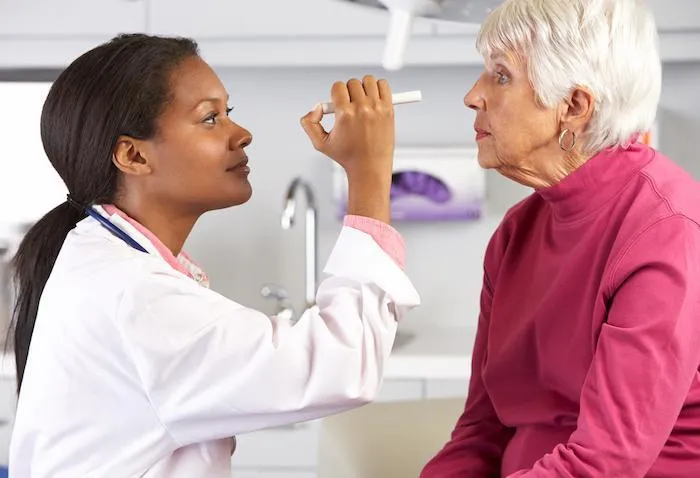Regular Eye Exams
The Importance of Regular Eye
Exams for Diabetics
The Importance of Regular Eye Exams for Diabetics
FSDAVCFEBFEVSDDVFSD
FSDAVCFEBFEVSDDVFSD
FSDAVCFEBFEVSDDVFSD
Prevent Vision Loss in Diabetics
Regular eye exams for diabetes patients are vital, serving as a frontline defense in preserving diabetic eye health. For those managing diabetes, these evaluations are not just routine checks; they are essential in preventing severe diabetic eye complications that can lead to vision loss.
By consistently monitoring the health of the eyes, specialists can detect early signs of conditions like diabetic retinopathy, allowing for timely intervention and treatment.
Regular eye exams for diabetes patients are vital, serving as a frontline defense in preserving diabetic eye health. For those managing diabetes, these evaluations are not just routine checks; they are essential in preventing severe diabetic eye complications that can lead to vision loss.


This proactive approach is crucial in maintaining not only visual health but also overall quality of life for those affected by diabetes.
Moreover, maintaining good blood sugar control, blood pressure, and cholesterol levels, alongside regular eye exams, plays a crucial role in protecting vision. Educating patients on the importance of these practices reinforces a comprehensive approach to diabetes management and eye health.
By consistently monitoring the health of the eyes, specialists can detect early signs of conditions like diabetic retinopathy, allowing for timely intervention and treatment. This proactive approach is crucial in maintaining not only visual health but also overall quality of life for those affected by diabetes.
Moreover, maintaining good blood sugar control, blood pressure, and cholesterol levels, alongside regular eye exams, plays a crucial role in protecting vision. Educating patients on the importance of these practices reinforces a comprehensive approach to diabetes management and eye health.
What are Diabetic Eye Complications?
Diabetes profoundly impacts eye health, predisposing individuals to a range of diabetic eye diseases that can severely affect vision. Diabetic retinopathy is the most common condition, where high blood sugar levels cause damage to the blood vessels in the retina, potentially leading to blindness if untreated.
Cataracts also develop at an earlier age in diabetics, clouding the eye's lens and diminishing the clarity of vision. Glaucoma, another serious condition, is about twice as likely in diabetic individuals compared to non-diabetics. It involves increased pressure inside the eye that can damage the optic nerve.
Understanding these risks underscores the importance of regular diabetic eye exams to monitor and manage these conditions effectively, safeguarding vision and overall eye health.
What to Expect in Diabetic Eye Exams

During diabetic eye exams, eye care professionals employ several specialized techniques to assess the health of the eyes and identify any early signs of diabetic eye complications. A key component of these exams is the dilated eye exam, where drops are used to widen the pupil, allowing a clearer view of the back of the eye, including the retina and optic nerve. This dilation is crucial for detecting signs of diabetic retinopathy and other issues.
Another critical tool is digital retinal imaging, which provides high-resolution images of the retina. These images are vital for tracking changes over time and diagnosing problems at their earliest stages. The detailed visuals help eye care specialists make accurate assessments and recommend appropriate treatments, ensuring that patients receive the most effective care for preserving their vision.
During diabetic eye exams, eye care professionals employ several specialized techniques to assess the health of the eyes and identify any early signs of diabetic eye complications. A key component of these exams is the dilated eye exam, where drops are used to widen the pupil, allowing a clearer view of the back of the eye, including the retina and optic nerve. This dilation is crucial for detecting signs of diabetic retinopathy and other issues.
Another critical tool is digital retinal imaging, which provides high-resolution images of the retina. These images are vital for tracking changes over time and diagnosing problems at their earliest stages. The detailed visuals help eye care specialists make accurate assessments and recommend appropriate treatments, ensuring that patients receive the most effective care for preserving their vision.

Another critical tool is digital retinal imaging, which provides high-resolution images of the retina. These images are vital for tracking changes over time and diagnosing problems at their earliest stages. The detailed visuals help eye care specialists make accurate assessments and recommend appropriate treatments, ensuring that patients receive the most effective care for preserving their vision.
Benefits of Regular Eye Examinations
Regular eye exams for diabetes patients are critical because they allow for the early detection of potential eye problems that are common among those managing the condition. Regular monitoring also helps maintain overall eye health, preventing other complications that can arise from untreated eye conditions.
Early detection is crucial in preventing the progression of diabetic eye diseases such as diabetic retinopathy, which is the leading cause of blindness in working-age adults.
By identifying signs of eye disease early, treatment can begin sooner, significantly reducing the risk of severe damage and vision loss. Additionally, these exams help monitor changes in vision, allowing for timely adjustments in vision care, which can improve daily functioning and overall quality of life.
Managing and Treating Diabetic Eye Diseases
Following diabetic eye exams, various treatments are available to manage and mitigate the progression of conditions like diabetic retinopathy. One primary treatment is laser surgery, which can seal leaking blood vessels or discourage new vessel growth, preventing further vision impairment.
Anti-VEGF injection therapy is another effective treatment, particularly for advanced diabetic retinopathy, as these injections help reduce vessel leakage and swelling in the retina.
For macular edema, corticosteroids may be used, either through injections or implanted devices that slowly release medication. Managing blood sugar levels, blood pressure, and cholesterol is crucial for slowing the progression of retinopathy and other diabetic eye diseases.

Following diabetic eye exams, various treatments are available to manage and mitigate the progression of conditions like diabetic retinopathy. One primary treatment is laser surgery, which can seal leaking blood vessels or discourage new vessel growth, preventing further vision impairment.
Anti-VEGF injection therapy is another effective treatment, particularly for advanced diabetic retinopathy, as these injections help reduce vessel leakage and swelling in the retina.

These treatment and management strategies are essential for maintaining vision health and preventing severe outcomes associated with diabetic eye conditions. Additionally, regular monitoring and timely interventions can help preserve vision and improve the quality of life for individuals with diabetes.
For macular edema, corticosteroids may be used, either through injections or implanted devices that slowly release medication. Managing blood sugar levels, blood pressure, and cholesterol is crucial for slowing the progression of retinopathy and other diabetic eye diseases.
These treatment and management strategies are essential for maintaining vision health and preventing severe outcomes associated with diabetic eye conditions. Additionally, regular monitoring and timely interventions can help preserve vision and improve the quality of life for individuals with diabetes.
Let’s Wrap Things Up
Ensuring the health of your eyes is crucial, especially for those managing diabetes. Regular diabetic eye exams are vital in detecting and managing conditions that could lead to serious vision problems. Don't wait for symptoms to appear; be proactive about your eye health. Contact Kleinwood Vision today to schedule your comprehensive diabetic eye exam and safeguard your vision.

Contact Info
Hours of Operation
Mon - Fri | 9:00 AM - 5:00 PM
Sat - Sun | Closed
Holiday Hours: We are closed for the following holidays: New Years Day, Memorial Day, Independence Day, Labor Day, Thanksgiving Day, Christmas Day
© 2026 Kleinwood Vision. All rights Reserved.


